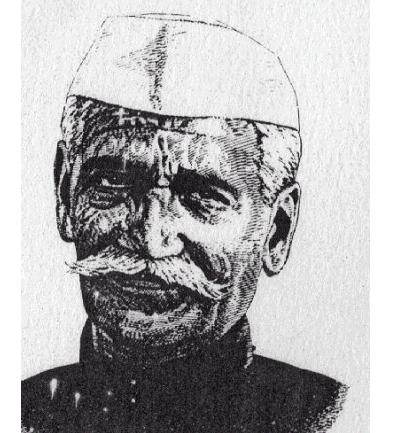User:Neeti m/Article on Acharya Narendra Dev
Acharya Narendra Dev ji
|
|---|
His initial education was at home under the guidance of his father who had written several textbooks for children. He studied Hindi, mathematics and geography under Pt. Kalidin Awasthi until the age of thirteen when he started going to school. During his school days he came in contact with Pt. Madhav Prasad Misra, a renowned writer of Hindi, who renamed him Narendra Dev.
Acharya Narendra Dev’s father was a religious man. He was also involved with Indian National Congress and Social Conference. As a result, Acharya Narendra Dev came under the influence of several religious men and renowned freedom fighters from a very young age. He had memorized many epics and religious books like Bhagvadgita, Ramayana and Mahabharat. He attended the session of Indian National Congress for the first time in 1899 in Lucknow at a young age of ten. Although, he confessed later, that he could not follow the proceedings but he realized the greatness of leaders like Lokmanya Tilak, Shri Ramesh Chandra Dutt and Justice Ranade.
In 1904, Pt. Madan Mohan Malviya visited his home and encouraged him to join Hindu Boarding House in Allahabad, which he subsequently did after his Entrance. He joined Indian National Congress as visitor in 1905 and witnessed the first of revolt within the Congress over the welcome of Prince of Wales, the use of Swarajya for the first time by Dadabhai Naraoji and the split in the Congress into moderates and extremists over the next few years. He was inclined towards the extremist group so he left the Congress in 1908. He later joined the Congress again when the two groups merged. At the same time he was influenced by the writings of Lala Hardayal, Bankim Chandra, Lights of Asia by Edwin Arnold and various other writers. He became the follower of Swadeshi and did not buy or use and foreign made thing.
He did his B.A. from Muir College, Allahabad and went on to do M.A. in Archeology from Queen’s College Varanasi. At Queen’s College, he met Shri Sachidanand Sanyal who introduced him to many leaders of the revolutionary movement. He sympathized with their cause but was against their methods of working. In 1915, he completed his L.L.B. and came to Faizabad to practice law. He opened a branch of Home Rule league in Faizabad and was elected its leader. He also became member of various Congress Committees and came in contact with Mahatma Gandhi. He left legal practice after non-co-operative movement was adopted at the Nagpur session of Congress. He joined Kashi Vidyapeeth on the invitation of Pt. Jawahar Lal Nehru and became its Chairman in 1926. He had two interests in life, education and politics and he enjoyed both at the Vidyapeeth. It was at this time that Shri Shriprakash started calling him ‘Acharya’ which soon became a part of his name.
In 1934, on the insistence of Shri Jaiprakash Narain he became the chairman of inaugural session of Socialist Party. He became a lifelong follower of socialist ideology. He actively participated in India’s struggle for freedom and was sent to prison several times for his efforts. After independence, in 1948, he left the Congress party when it changed its ideology. He became chairman of Socialist party in 1948 and Democratic Socialist Party in 1955. He was member of Legislative Assembly from 1937 to 1948 and member of Rajya Sabha from 1952 until his death.
Acharya Narendra Dev was also active educationist. He was Vice Chancellor of Lucknow University from 1947-51 and Benaras Hindu University from 1951-53. He was also a dedicated teacher who believed that teachers should teach their students to become selfless, self-disciplined and above all good citizens and a better human being. He wanted all Indians to be educated and not simply literate. He knew that a young democracy like India could progress only if all its citizens were educated. He wrote several articles on education and religion. He was a member of various committees for the development of Hindi language and literature, such as All India National Language Committee and Hindi Sahitya Sammelan.
This article was published in the college magazine.
